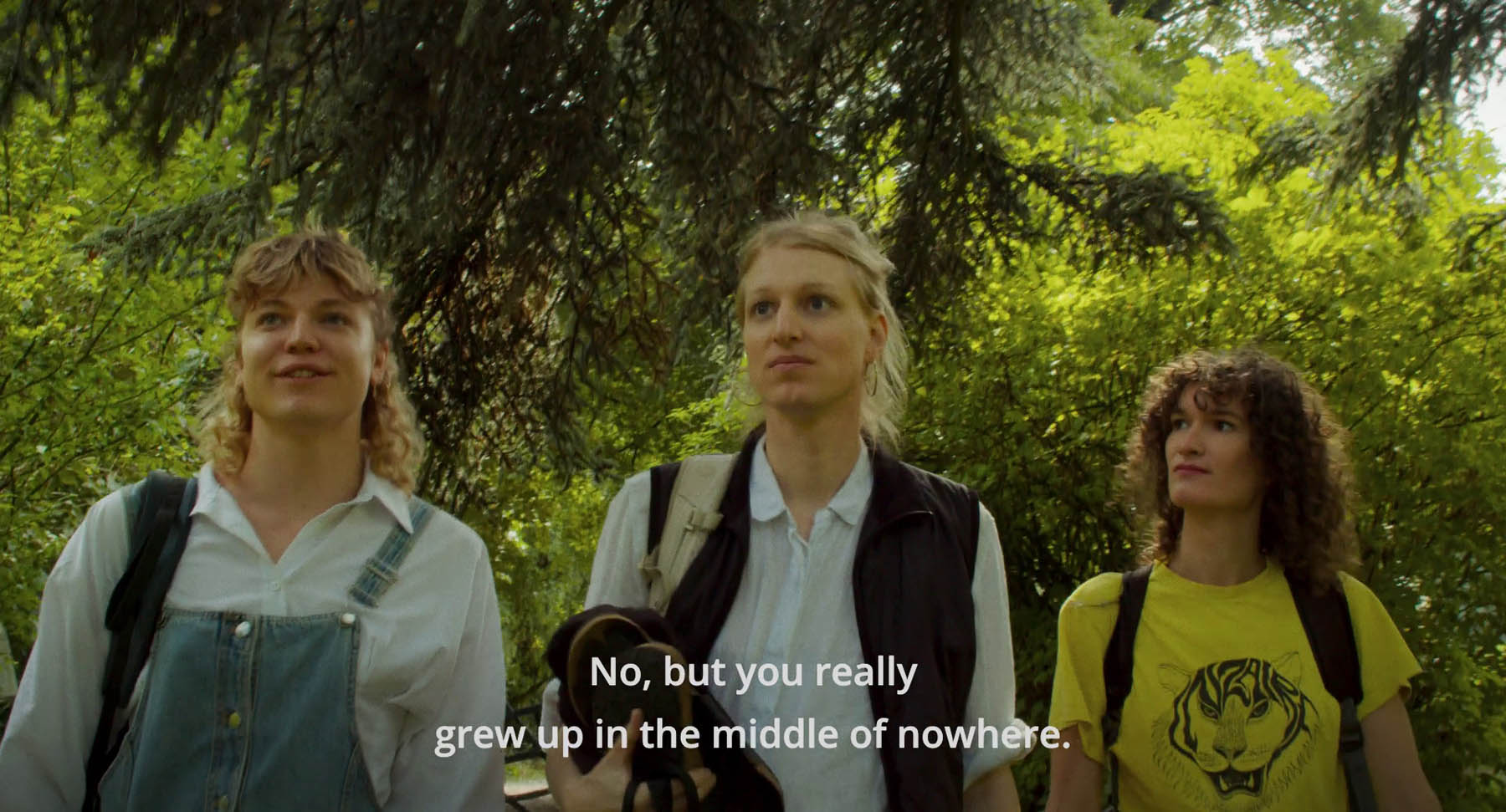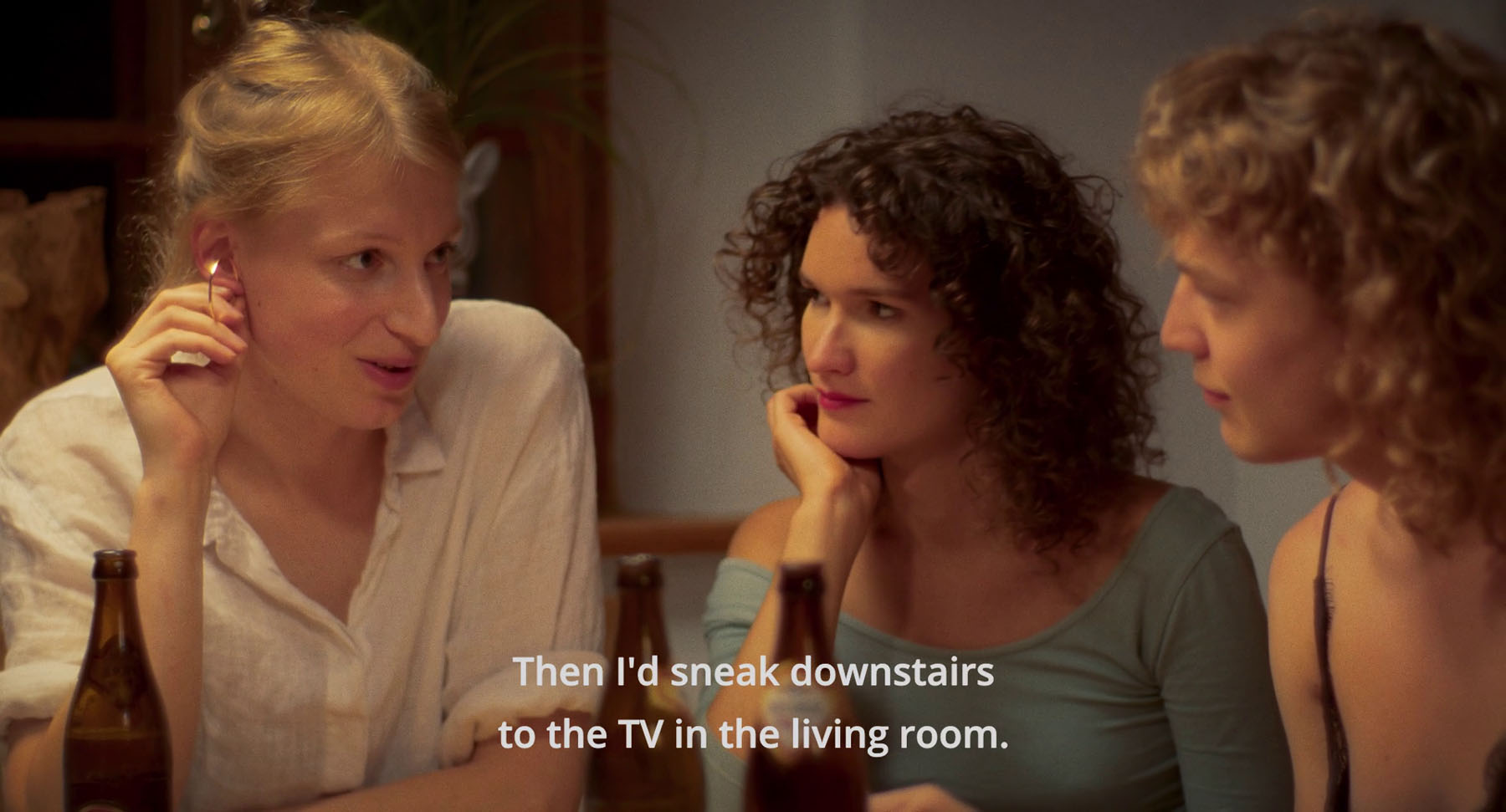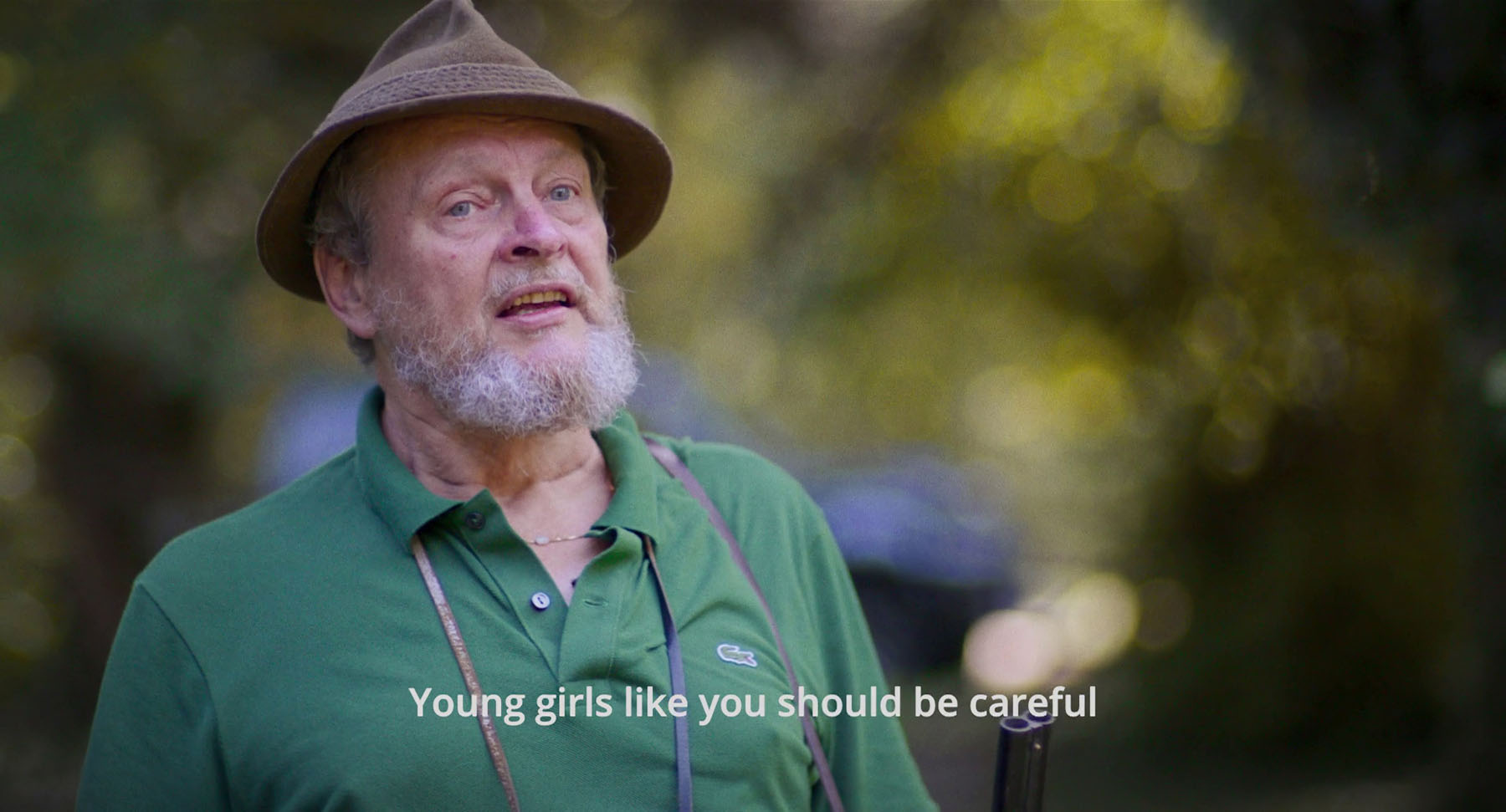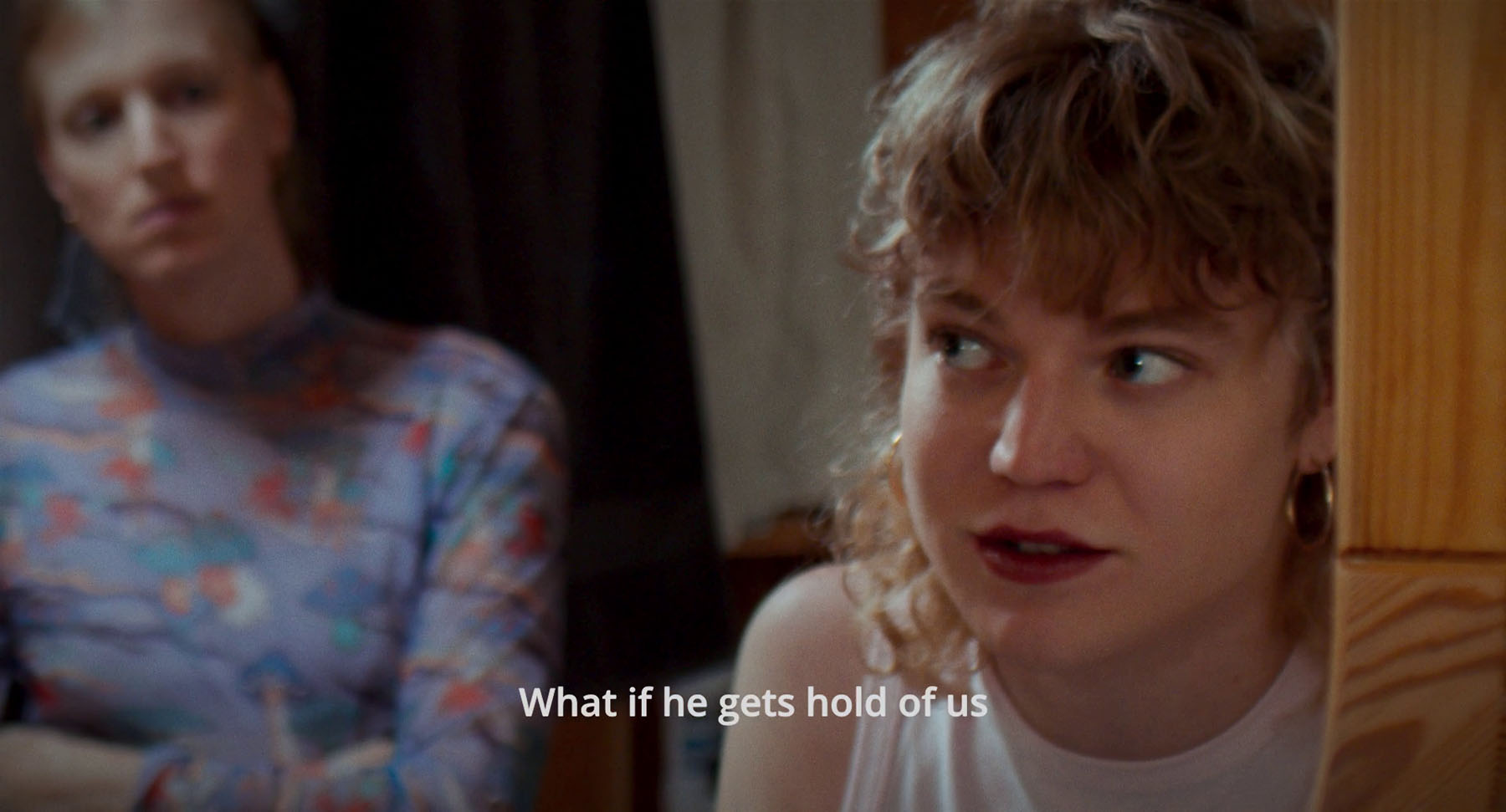Die Räuberinnen
short movie,15:45, digital 2k, 2023
Director, Screenplay, Producer: Isa Schieche
Cinematographer, Light: Alba Diaz
Sound recording, Sound design: Katharina Pichler
Editor, Graphic: Sybille Bauer-Zierfuss
Color correction: Michael Seidl
Title design: Kora
Production assistant: Ines Höckner
Foley artist: Otger Kunert
Subtitles: Wortschatz Produktion, Stefania Schenk Vitale
Set photography: Juliane Schweitzer
Catering: Ines Höckner, Juliane Schweitzer, Marianne Karigl
Music: Lan Rex, Dance Divine, Italo Brutalo
Three trans women meet in a country house to plan a robbery. The trick of the heist is that, in order to create a false trail, they disguise themselves as men. While they share everyday life as a well-established team and lovers, they practice speaking in a deep voice, walking manly and behaving in a masculine manner.
In this process, they reach their emotional and physical limits and repeatedly fail to imitate male connoted behavior.
"Die Räuberinnen" is a sociological analysis of male- and female-attributed behavior and traits, shaking up binary role models in a swirl of radicalism and activism.
Festivals:
Queertactics Vienna 2023 - winning Goldene Medusa
Queer Shorts Vienna 2023
Filmfestival Max Ophüls Preis Saarbrücken 2024 - Jury Award Best Short
SXSW Austin Texas 2024
Mardi Gras Film Festival Sydney Australia 2024
ENCOURAGE Film Talents Berlin 2024
SXSW - South by Southwest Film Festival 2024
Landshuter Kurzfilmfestival 2024
BFI Flare London 2024
Uruguay International Film Festival Cinemateca 2024
Wicked Queer: Boston’s LGBT Film Festival 2024 - Audience Award
Diagonale -Festival des österreichischen Films Graz 2024
Crossing Europe Linz 2024
PORTO FEMME International Film Festival April 2024
TILDE – Melbourne Trans & Gender Diverse Film Festival 2024
Cinema Talks Filmfestival 2024 - Winner in Cat. Entertainment
Inside Out 2SLGBTQ+ Film Festival Toronto 2024
Queerzilla Wien 2024
Korea Queer Film Festival 2024
Dortmunder Tresen Filmfestival 2024
Palm Springs International Film Festival 2024
Frameline48, the San Francisco International LGBTQ+ Film Festival 2024
Queer Rhapsody Film Series Los Angeles 2024
Filmfestival Kitzbühel 2024
CinemaQ Film Festival 2024
Shortynale Klosterneuburg 2024
Dotdotdot Open Air Kurzfilmfestival, Austria 2024 - Audience Award
Minikino Filmweek, Indonesia 2024
Festival of Nations, Austria 2024
KinoFest German Language Film Festival Greece 2024
VANCOUVER QUEER FILM FESTIVAL 2024
Calgary International Film Festival, Canada 2024
Les Mains Gauches, Marseille 2024
Vilnius Queer Festival "Kreivės" 2024
QueerFilmFest Rostock 2024
QUEER FILM FESTIVAL BREMEN 2024
Edinburgh Short Film Festival 2024
Linz International Short Film Festival 2024 - Best Queer
Annual Way OUT West Film Fest, 2024
Cinema Next Tour, Austria 2024 - Jury Award
Nordic International Film Festival New York - Best Director
Filmkunsttage Sachsen-Anhalt 2024
Queer Film Festival Oldenburg 2024
Filmzuckerl 2024
Festival du film LGBTQI de Paris Chéries-Chéris 2024
Cottbus Film Festival 2024
Beijing International Short Film Festival 2024
Leeds Queer Film Festival 2025










Jules Gleeson about “Die Räuberinnen”:
For Die Räuberinnen the city is conspicuous by her absence, the opening shot establishing our surroundings with bucolic green fields which our protagonists both operate at a remove from (with their urbane glamour, one remarking to another “you really grew up in the middle of nowhere as an opening act of distancing), while in part clearly belong to (accents especially). We watch as one of Die Räuberinnen returns to her home (not even a town), where all of them will return purposefully, temporarily, to manhood.
The main focus for our Räuberinnen is readying themselves for a heist, a scheme which demands them “manning up” for a crime where their manly guises will serve as foolproof cover. The film’s opening scenes follow the trio as they pass through the process of preparing their perfect crime. This transformation requires picking out suitably non-descript attire: first jeans, hoodies and button-up shirts replacing dresses and dungarees, then binders after sports bras are deemed insufficient. The dialogue runs back-and-forth between characters and options as masculine trappings are considered, attempted, discarded. Anyone who attended a drag king workshop will quickly recognise this process, but here the end is not controversial entertainment, but outright robbery.
Die Räuberinnen then train each other with posture instructions, teaching each other how to stand and move. They share boxing bouts and role playing exercises, one of the trio playing the imagined victim, offering tips as they gameplan various paths their crime could take, and remarking on her preference for a captor with a gentle discernment.
It’s the task of this little text to spell out for you reading this double-sided page what the movie mostly only teases at, and heavily implies: this drag act is no ordinary metamorphosis, but one of reversal. The film’s conceit is masculinity returning as a layering across a trans-female surface. These ladies are doubling back on themselves, or perhaps flipping their transitions. But while that much is clear, many questions remain: does this scheme cover over on the exotic and everyday womanhood these characters adopted, or double down on their skills at calculated stylisation? What makes such an unlikely masc patina seem worth adopting? What does it really mean to make a disguise belong to you?
What’s left unclear is how much of a “return” their drag-heist truly is: are we watching an act of them remembering and temporarily reviving bygone personae, or are these techniques of manhood new attire that they’re mastering now for the first time? Die Räuberinnen remains too mysterious for us to really judge: we only receive snatches of their histories (as two reminisce together). For the most part we only see them plotting, at play, and (finally) at work.
As they relax together, the film also demonstrates the on-going continuity of their everyday lives in motion, estrogel smeared across their skin as they dance together, and finally entwine. This display of sapphic intimacy is clipped short by gunshots, as a row between two of Die Räuberinnen breaks out over target practice (echoing around the sleepy region).
Following this dispute, we see the film’s only scene featuring on screen outsiders confronting the gang. An armed local, Sepp, encounters Die Räuberinnen, warning them against the poacher (in reality their training gunshots). This brief scene is a loaded one. On the one hand the extent of surveillance those in rural areas apply to each other is made clear: the ferocious gossip that exists simply for lack of much else to do besides it. Out here in “the middle of nowhere”, no false move will not be noticed, and spread quickly. This pervasive observation stands clearly in opposition to any hopes of Die Räuberinnen’s plot succeeding.
Yet the extent of our outsider’s obliviousness, which passes over more smoothly than our conspirators can easily believe, is surely immediately recognisable not only to many trans viewers but all those who attempt to live their lives openly as lesbians…Only to find their passion illegible to so many encountering it. Quite different from outrage or horror, this refusal to see provides scope for hiding, at the cost of denial.
Far from suspecting the gang, Sepp refers to Die Räuberinnen as “Young girls”. This diminutive hints not only at the unreconstructed sexism that can still survive unchallenged in their surroundings, but also his obliviousness to the technology of transition (in either direction!) that he has stumbled upon. Hinting at the success of their venture, Sepp sees the conspirators as innocents, sharing his simplicity, and requiring his protection. On another level his identification of our robbers as young girls references communist collective Tiqqun’s most notorious text, Théorie de la jeune fille, which dives into the feminising (and effeminating) constitution of the contemporary capitalist slut-subject. This is assuredly an unwitting namedrop by the simple rural gent, further underscoring the contrast with one of Die Räuberinnen, who his appearance interrupts from idly perusing Philosophy For Spiders (McKenzie Wark’s exploration of her late friend Kathy Acker’s “low theory”). The extent to which female mischief is underestimated by this investigation lends an air of dry comedy. If it’s the task of men to behold and of women to be seen, we see here a reversal through theoretical reference itself: it seems that witnessing womanhood can also strike male on-lookers blind.
Delightfully, we receive no explicit answer as to the motivation of the crime. This question in one scene sits suspended, one robber-girl asking another why in a moment of doubt, receiving no reply. Speculations are simple enough: surgeries, debts accumulated through any number of transition costs, perhaps revenge for whatever reason a trio of transsexuals might have been wronged. The ambivalence sets up a kind of mystique, but also requires we extend some trust to the characters: a hostile viewer could easily read into this silence a mindless criminality, yet the softness and uncertainty of Die Räuberinnen as they ready themselves for the heist strongly implies their scheme is a one-off, rather than a regular jape.
But who could easily resist a sequel, then another “one last job”?
There’s a word which I’ve been avoiding using so far through fear it would shape reception of this short film in some predictable ways. It’s a funny quandary that writers find ourselves in pretty often: the concepts we’re toying around with are always “played out” (hackneyed, cliché, or just tired) among certain audiences, while others picking up our texts will find themselves introduced to these ideas, these terms of art (for the first time). It’s impossible to twist an idea, to “subvert” it, without also breathing new life into it, and carrying it on to new audiences. Our attempts to wriggle free of the standard form, or make light of disciplinary norms, actually expose them to people who don’t have these reference points rattling around in their head (yet!) Anyway, to spit it out: I’ve been trying to avoid saying our robber-girls are locked into a performance.
Performing is a funny thing, much like writing prone to referencing other shows, other acts, the audience may only know through this gesture. This can lend itself to elaborate back-and-forths which are well established in theatrical performance: Shakespeare’s Midsummer Night’s Dream (written between 1595-1596) toyed with having its all-male actors flip between man and womanhood with a comedic flourish.
Yet this history of playful fluidity exists uneasily with lives that may be dramatic, but extend well beyond the stage. We see this ambivalence surface earlier as one of Die Räuberinnen calls another “natural” at the task of manning-up, with an offended response seeing her quickly double back with: “baby…I didn’t mean it like that”. Here we see the predicament of the robber-girl’s mission: to adopt the guises they’ve chosen so seamlessly that they might return to their everyday reality as women unmarked. Their survival demands a dissonant cultivation of skills they’d previously pointedly refused. But can success in these terms be so easily walked away from?
This layering is added to once more by one of Die Räuberinnen recounting to her peers an act of hers (form unspecified) leaving an impression on a friend, who confided that she also used estrogel to manage her endometriosis (uterine tissue forming beyond the uterus, usually causing scarring and inflammation across the pelvis). It doesn’t seem like a simple coincidence that this tale of a performance’s aftermath is accompanies a moment of solidarity between women recounted in the conversation between friends, with a second (on camera) between Die Räuberinnen, at the same moment the word “transgender” is used explicitly for the first and only time. Two pairs of women recount their shared experiences, one on screen and one spoken of, one pair sharing their commonality, and the second doing just the same.
While many ambiguities are sustained, what the film leaves unmistakably clear is that Die Räuberinnen are a trio of women passing for men (if perhaps not for the first time). What we witness is not the free play of fluid forms, but what had been fixed becoming refixed. It’s perhaps fitting that the film’s finale delivers us only a glimpse as two of our robber-girls carry out the heist. The credits (and a decidedly urban techno soundtrack) cut across the robbery itself, leaving the outcome as unclear, yet easily guessed as the crime’s motive. Don’t flinch from cheering them on.